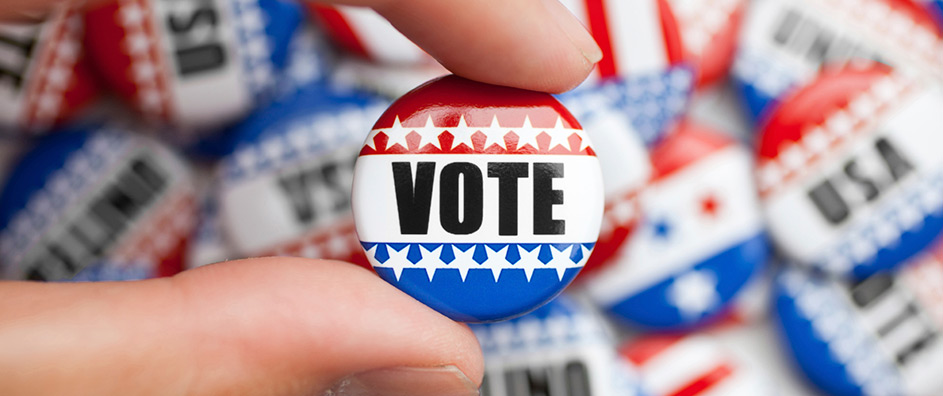The views expressed in our content reflect individual perspectives and do not represent the authoritative views of the Baha'i Faith.
Everyone can now breathe a sigh of relief—the United States presidential election is now behind us. I hope that all of you around the world weren’t too freaked out. It’s a wild ride for us Americans too. Now that it’s over and we can finally take a deep breath, it can be edifying to think about the individual’s emotional connection to politics and what the Baha’i teachings have to say about it.
One of the major themes of this presidential election has been the widespread disillusionment of voters with the political system. That disillusionment isn’t just an American phenomenon—it happens just about everywhere. It has led voters from many points on the political spectrum to consider supporting outsider candidates they might have previously overlooked. That restlessness appears to make people open to new things.
But this clashes with another theme that has also been widely noted but hasn’t received nearly as much attention. For all the drama and unpredictability of the election season, voters very consistently support the same parties that they have in the past, and very rarely cast their votes for candidates outside the two major parties. In the past two decades or so, that voting behavior has become remarkably stable and predictable. Strangely, widespread disillusionment with the partisan system coexists alongside a hardening of partisan loyalty.
 The basic problem? Politicians have a much harder time to get voters to actively like the way they want to govern. People are too fed up and disillusioned for that. So in order to get people’s votes, politicians will focus on the flaws of their opponent. It’s bizarre, but politicians are considered effective campaigners if they can keep the negative attention on the person they’re running against. After all, if voters don’t have anything nice to say, it might as well be about your opponent rather than about yourself.
The basic problem? Politicians have a much harder time to get voters to actively like the way they want to govern. People are too fed up and disillusioned for that. So in order to get people’s votes, politicians will focus on the flaws of their opponent. It’s bizarre, but politicians are considered effective campaigners if they can keep the negative attention on the person they’re running against. After all, if voters don’t have anything nice to say, it might as well be about your opponent rather than about yourself.
As a result, we’re constantly bombarded with horrible statements about our politicians and leaders, both before they enter office and after. As time goes on, we learn that this or that politician is corrupt, ignorant, hateful, etc., and that giving him or her power will lead to dictatorship and the collapse of civilization. For months on end we hear competing predictions about the decline and fall of the republic. It’s very dispiriting. But rather than tune out the partisan bomb-throwing, voters fall for it, aligning themselves more consistently with the party opposing the one they fear the most, and joining in on the hurling of insults.
It’s not just Americans who get very emotionally invested in their elections—many countries hold elections that descend into violence or even civil war. This oppositional dynamic contributes to the decay of the political system the voters want to reverse. It is on this point that Baha’u’llah, the founder of the Baha’i Faith, offered an alternative.
One of his simplest statements on the relation between religion and politics is found in these two sentences.
O kings of the earth!… It is not Our wish to lay hands on your kingdoms. Our mission is to seize and possess the hearts of men. – Baha’u’llah, The Most Holy Book, p. 49.
In another passage Baha’u’llah restates the separation between these two domains of authority:
The one true God, exalted be His glory, hath ever regarded, and will continue to regard, the hearts of men as His own, His exclusive possession. All else, whether pertaining to land or sea, whether riches or glory, He hath bequeathed unto the Kings and rulers of the earth. – Gleanings from the Writings of Baha’u’llah, p. 206.
In a superficial sense, it looks like the Baha’i teachings give politics considerable autonomy from religion. God gets the hearts of men and the kings and rulers of the world are given authority over all else. That sounds like a lot. But if you give careful attention to how societies maintain order and transform themselves over time, it becomes clear that the realm of politics takes a big loss by relinquishing the hearts of the people.
Think about it. The heart has to do with people’s sense of purpose in life, their moral and intellectual development, their loyalties, and their affections. Once we give our hearts to something, we will dedicate ourselves to it, in our life and through to our death. These matters of the heart, the Baha’i teachings say, are subject to divinely-revealed guidance found in religion, and are off-limits to political leaders. Baha’u’llah wants the love of God to be people’s source of motivation. He wants our hearts to belong to God, not to any politician, conqueror, or revolutionary.
Of course, some people may say that they haven’t given their heart to any politician. They’re just trying to keep this or that person out of power. While that may be true, it’s also important to consider that the politicians they vote for blatantly and successfully manipulate our emotions to win their support. They know how to grab our attention, and they know how to make us afraid. Once they control the hearts of the people in this way, they gain considerable power.
So don’t give your heart to politicians. It doesn’t rightfully belong to them. Give it to God. After all, He actually knows what to do with it.
















Comments
Sign in or create an account
Continue with Googleor